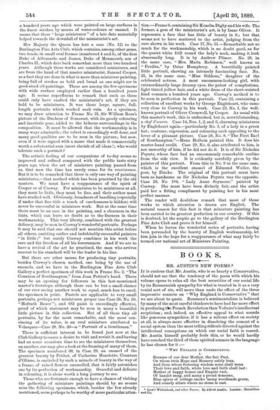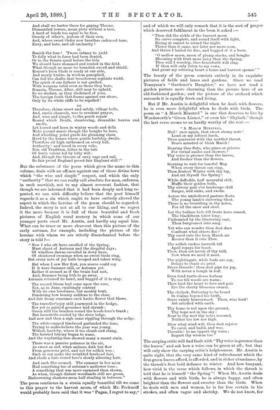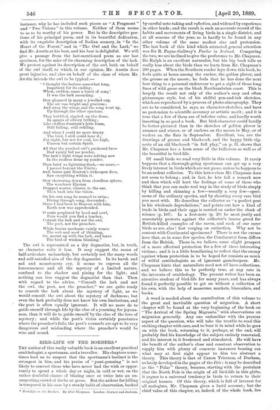BOOKS.
MR. AUSTIN'S NEW POEMS.* IT is curious that Mr. Austin, who is so hearty a Conservative, should not see that the tendency of the poem with which his volume opens to relax all the best securities of our social life by its Rousseauish sympathy for what is treated in it as a very venial sort of sin, will more than undo the effect of the three impressive sonnets on "Why England is Conservative" that we are about to quote. Rousseau's sentimentalism is believed by many of the most careful thinkers to have had far more effect in producing the French Revolution than Voltaire's intellectual scepticism ; and, indeed, an effective appeal to what sounds like generous sympathies. if it has a solvent effect on society at all, is always more effective in dissolving the cement of a social system than the most telling ridicule directed against the intellectual conceptions on which our social faith is reared.. Mr. Austin himself probably feels this, or he would hardly have couched the third of these spirited sonnets in the language he has chosen for it :— " WHY ENGLAND IS CONSERVATIVE.
I.
Because of our dear Mother, the fair Past, On whom twin Hope and Memory safely lean, And from whose fostering wisdom none shall wean Their love and faith, while love and faith shall last : Mother of happy homes and Empire vast, Of hamlet snug, and many a proud demesne, Blue spires of cottage smoke 'mong woodlands green, And comely altars where no stone is cast.
• Loves-Widowhood, and other Poems. By Alfred Austin. London : DfegenBlea and Co.
And shall we barter these for gaping Throne, Dismantled towers, mean plots without a tree, A herd of hinds too equal to be free, Greedy of other's, jealous of their own, And, where sweet Order now breathes cadenced tone, Envy, and hate, and all uncharity ?
IL Banish the fear ! 'Twere infamy to yield To folly what to force had been denied, Or in the Senate quail before the tide We should have stemmed and routed in the field.
What though no more we brandish sword and shield, Reason's keen blade is ready at our side, And manly brains, in wisdom panoplied, Can foil the shafts that treacherous sophists wield.
The spirit of our fathers is not quelled. With weapons valid even as those they bore, Domain, Throne, Altar, still may be upheld, So we disdain, as they disdained of yore, The foreign froth that foams against our shore, Only by its white cliffs to be repelled !
Therefore, chime sweet and safely, village bells, And, rustic chancels, woo to reverent prayer, And, wise and simple, to the porch repair Round which Death, slumbering, dreamlike heaves and swells.
Let hound and horn in wintry woods and dells Make jocund music though the boughs be bare, And whistling yokel guide his gleaming share Hard by the homes where gentle lordship dwells.
Therefore sit high enthroned on every hill, Authority ! and loved in every vale; Nor, old Tradition, falter in the tale Of lowly valour led by lofty will : And, though the throats of envy rage and rail, Be fair proud England proud fair England still !"
But the substance of the poem which gives the name to this volume, deals with an offence against one of those divine laws which "the wise and simple" respect, and which the only " authority " that we can really call absolute for man, enforces, in such mawkish, not to say almost reverent fashion, that though we are informed that it had been deeply and long re- pented, we can with difficulty believe that the poet himself regards it as a sin which ought to have entirely altered the aspect in which the heroine of the poem should be regarded. Indeed, the story is not at all to our liking, and we regret it the more because it is full of those beautiful and fresh pictures of English rural scenery in which none of our younger poets excel Mr. Austin, and hardly any equal him. What can be truer or more clear-cut than this picture of the early autumn, for example, including the picture of the heroine with whom we are utterly disenchanted before the story is told 12— " Now I who oft have carolled of the Spring, Must chant of Autumn and the dirgeful days; Of windless dawns enveiled in dewy haze, Of cloistered evenings when no sweet birds sing,
But every note of joy hath trooped and taken wing.
But when I saw Her first, you scarce could say If it were Summer still, or Autumn yet.
Rather it seemed as if the twain had met, And, Summer being loth to go away, Autumn retained its hand, and begged of it to stay.
The second bloom had come upon the rose, Not, as in June, exultingly content With its own loveliness, but meekly bent, Pondering how beauty saddens to the close, And fair decay consumes each hectic flower that blows.
The traveller's-joy still journeyed in the hedge, Nor yet to palsied gossamer had shrunk : Green still the bracken round the beech-tree's trunk ; But loosestrife seeded by the river ledge, And now and then a sigh came rippling through the sedge.
The white-cupped bindweed garlanded the lane, Trying to make-believe the year was young. Withal, hard-by, where it too domb and clung, The berried bryony began to wane, And the wayfaring-tree showed many a russet stain.
There was a pensive patience in the air, As sweet as sad, when sadness doth but flow From generous grief, and not for selfish woe : Such as can make the wrinkled forehead fair, And sheds a halo round love's slowly silvering hair.
And such She seemed. The summer in her mien Had something too of autumn's mellower tone ; A something that was more surmised than shown, As when, though distant woodlands still are green,
Embrowning shadows seem half stealing in between."
The poem continues in a strain equally beautiful till we come to this prayer to the harvest moon, of which Mr. Pecksniff would probably have said that it was "Pagan, I regret to say," and of which we will only remark that it is the sort of prayer which deserved fulfilment in the boon it asked :-- "Then did the sickle of the harvest moon
Its curve complete, and round itself with light, Rising at sunset to retard the night.
Thrice thus it came, nor later nor more soon, And thrice I hailed its disc, and begged of it a boon.
0 mellow moon, moon of plump stacks, and boughs Blooming with fruit more juicy than the Spring, Thee will I worship, thee henceforth will sing, If thou wilt only listen to my vows, And grant my sobering heart a home and harvest spouse.'
The beauty of the poem consists entirely in its exquisite pictures of fields and lanes and gardens. Since we read Tennyson's "Gardener's Daughter," we have not read a garden picture more charming than the picture here of an old-fashioned garden; and the picture of the orchard which succeeds it is equally fresh and living.
But if Mr. Austin is delightful when he deals with flowers, he is even more delightful when he deals with birds. The poem on "A March Minstrel" is one that deserves to live by Wordsworth's "Green Linnet," or even his "Skylark," though the last verse seems to us hardly worthy of the rest :— " A MARCH MINSTREL.
Hail ! once again, that sweet strong note ! Loud on my loftiest larch, Thou quaverest with thy mottled throat, Brave minstrel of bleak March !
Hearing thee flute, who pines or grieves For vernal smiles and showers ? Thy voice is greener than the leaves, And fresher than the flowers.
Scorning to wait for tuneful May When every throat can sing, Thou floutest Winter with thy lay, And art thyself the Spring !
While daffodils, half mournful still, Muffle their golden bells, Thy silvery peal o'er landscape chill Surges, and sinks, and swells.
Across the unsheltered pasture floats The young lamb's shivering bleat. There is no trembling in thy notes, For all the snow and sleet.
Let the bullace bide till frosts have ceased.
The blackthorn loiter long ; Undaunted by the blustering east, Thou burgeonest into song.
Yet who can wonder thou dost dare Confront what others flee ?
Thy carol cuts the keen March air Keener than it cuts Thee.
The selfish cuckoo tarrieth till April repays his boast.
Thou, thou art lavish of thy trill, Now when we need it most.
The nightingale, while buds are coy, Delays to chant its grief.
Brave throstle ! thou dost pipe for joy, With never a bough in leaf.
Even fond turtle-doves forbear To coo till woods are warm : Thou hast the heart to love and pair Ere the cherry blossoms swarm.
The skylark, fluttering to be heard In realms beyond his birth, Soars vainly heavenward. Thou, wise bird ! Art satisfied with earth.
Thy home is not upon the ground, Thy hope not in the sky : Near to thy nest thy notes resound, Neither too low nor high.
Blow what wind will, thou dost rejoice To carol, and build, and woo. Throstle! to me impart thy voice ; Impart thy wisdom too."
The carping critic will find fault with "Thy voice is greener than the leaves," and ask how a voice can be green at all ; but that will only show the carping critic's helplessness. Mr. Austin is quite right, that the very same kind of refreshment which the. first green leaves afford, is afforded, and in richer abundance, by the thrush's first bold defiance to winter. And how buoyant, how vivid is the verse which follows, in which the thrush is told that he is himself "the Spring"! When Mr. Austin deals. with flowers and with birds, he is always happy, and often brighter than the flowers and sweeter than the birds. When he deals with men and women, he is far less certain in his strokes, and often vague and sketchy. We do not know, for instance, why he has included such pieces as A Fragment" and "Two Visions" in this volume. Neither of them seeras to us to be worthy of his power. But in the descriptive por- tions of his principal poem, and in its beautiful dedication, with its exquisite description of Italian scenery, in "In the Heart of the Forest," and in "The Owl and the Lark," we find Mr. Austin at his best, and his best is delightful. We will give a passage from the last-mentioned poem as our last specimen, for the sake of its charming description of the lark. We protest against its description of the owl, both on behalf of the owl itself, to which, in our opinion, Mr. Austin does great injustice, and also on behalf of the class of whom Mr. Amtin intends the owl to be typical :— " I thought the lecture somewhat long, Impatient for its ending;
When, sudden, came a burst of song ! It was the lark ascending.
Dew gleamed in many a jewelled cup, The air was bright and gracious ; And away the wings and the song went up, Up through the ether spacious.
They bubbled, rippled, up the dome, In sprays of silvery trilling ; Like endless fountain's lyric foam, Still falling, still refilling And when I could no more descry The bird, I still could hear it ; For sight, but not for soul, too high, Unseen but certain Spirit.
All that the perched owl's puckered brow Had vainly bid me ponder, The lark's light wings were solving now In the roofless dome up yonder.
Then brief as lightning-flash,—no more,— I passed beyond the Finite; And, borne past Heaven's wide-open door, Saw everything within it.
Slow showering down from cloudless sphere, The wanderer Elysian Dropped nearer, clearer, to the ear, Then back into the vision.
On his own song he seemed to swim ; Diving through song, descended : Since I had been to Heaven with him, Earth now was apprehended.
0 souls perplexed by hood and cowl, Fain would you find a teacher, Consult the lark and not the owl, The poet, not the preacher.
While brains mechanic vainly weave The web and woof of thinking, Go, mount up with the lark, and leave The bird of wisdom blinking."
The owl is represented as a dry dogmatist, but, in truth, no character suits it less. It may suggest the moan of half-articulate melancholy, but certainly not the many words and self-satisfied airs of the dry dogmatist. In its harsh and sad and monotonous cry, it seems to express all the lonesomeness and all the mystery of a limited nature, confined to the shadow and pining for the light ; and nothing can less suggest the dogmatist than that. Then with regard to the advice, "Consult the lark and not the owl, the poet, not the preacher," we are quite ready to consult the lark about the mystery of light, as we would consult the owl about the mystery of darkness; but even the lark probably does not know his own limitations, and the poet is often equally ignorant. It will no more do to guide oneself through life by the clue of a yearning for joyous- ness, than it will do to guide oneself by the clue of the love of mystery ; and while the poet's vision certainly penetrates where the preacher's fails, the poet's counsels are apt to be very dangerous and misleading where the preacher's would be wise and sound.




































 Previous page
Previous page